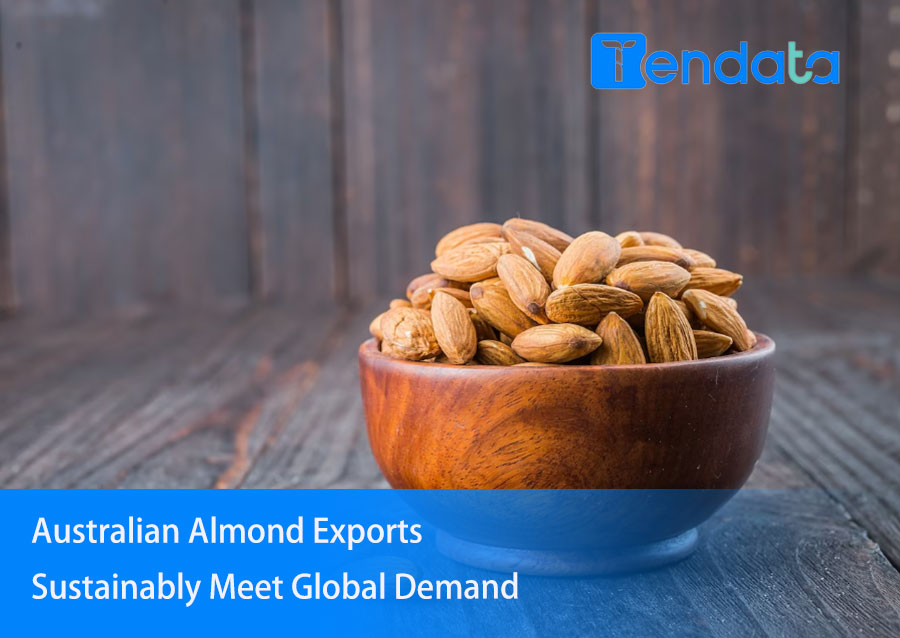 Export News
Export News
 04-02-2024
04-02-2024
Australia is not just a destination for breathtaking scenery but also a significant player in the global almond export industry. With a surge of over 213% in the past decade, Australian almond exports have become a prominent force in the international market. This article explores the current status of Australian almond exports, key markets, sustainable practices, and the evolving trends in the trade.

1. Australian Almond Industry Overview:
Australia, the largest almond producer in the Southern Hemisphere, boasts a flourishing almond industry. With more than 17 million almond trees spanning over 58,500 hectares in New South Wales, Victoria, South Australia, and Western Australia, the industry's farm value is expected to surpass 1.3 billion USD by 2025. The cultivation of almonds dates back to 1836 when the first almond tree was planted on Kangaroo Island in South Australia.
2. Export Statistics and Key Markets:
In the fiscal year 2020-21, Australian almond exports reached a staggering 545 million USD, with approximately 67% of exports directed towards the Asia-Pacific region and Oceania. China, India, Vietnam, and New Zealand stand out as the top four markets for Australian almonds. The export volume witnessed a remarkable growth of 213% in the last ten years, maintaining stability in the 2021-22 fiscal year. Notable increases were observed in European and Middle Eastern markets, with a 24% and 43% growth, respectively.
3. Sustainable Agriculture Practices:
Amidst the escalating demand, Australian almond farmers are embracing sustainable agricultural practices to ensure long-term growth. Recognizing the importance of minimal environmental impact, growers are adopting green agricultural practices, such as advanced irrigation techniques to enhance water efficiency. Every drop of water contributes to increased crop yield, aligning with the industry's commitment to sustainability.
According to industry experts, the almond sector's unique characteristic lies in zero wastage. Extended shelf life ensures every part of the almond is utilized, with even hulls and shells repurposed for feed and energy. As part of the Australian Bar Association's Sustainable Almond Program, exporters may soon need to demonstrate their sustainability credentials when bidding for supply contracts.
4. International Trade Trends:
The Australian almond industry is experiencing rapid expansion due to soaring global demand. Both existing farmers are expanding orchards, and newcomers are developing green spaces to capitalize on the high-demand product. The industry's remarkable growth prompts a continuous focus on environmentally friendly practices, ensuring that expansion does not compromise the ecosystem.
5. Tapping Into Global Markets Using Tendata:
To enhance import and export businesses, market analysis and finding potential clients are crucial. Utilizing tools like Tendata's import-export database can provide invaluable insights into market trends, consumer behavior, and potential competitors. By leveraging such databases, businesses can make informed decisions, identify emerging opportunities, and stay ahead in the competitive international trade landscape.
Conclusion:
Australian almond exports are not just a story of remarkable growth but also a testament to sustainable agricultural practices. The industry's commitment to minimizing environmental impact and zero wastage sets it apart. As the global demand for almonds continues to rise, strategic insights from databases like Tendata can empower businesses to navigate the dynamic international trade landscape successfully. The Australian almond industry stands as a shining example of how growth and sustainability can go hand in hand, securing a prosperous future for both farmers and the environment.
How effective is Tendata Customs Data?
Shanghai Tendata is a leading global trade data provider, our data covers 218 countries and regions around the world. Among them, customs data is a very core part of Tendata's data system, which currently includes more than 80 countries around the world. Tendata first started by trade data, trade data in the customs data are from formal official channels, directly reflecting the real-time update of the relationship between the enterprises of various countries, the purchase and sale of goods, the price of the Tendata customs data information is comprehensive, true and accurate for the development of foreign customers is very valuable to use. Tendata's customs data information is comprehensive, true and accurate, which is very valuable for developing foreign customers.(>>> Click for More Details)
Of course, in addition to customs data, Tendata's business data and Internet data resources come from strategic cooperation with many well-known overseas commercial companies, and are also extremely valuable. In addition to the query function, it also helps importers and exporters to intelligently analyze the market, monitor customers and competitors, supervise and manage customers and trade dynamics. Import and export enterprises can make intelligent one-key inquiry by product, company name, HS code, SIC code and other information. It can also directly tap the key person contact information of target customers and directly get the phone number, email address and social account of the boss, purchasing and CEO. Importers and Exporters can take the initiative in a multi-method and multi-dimensional way to quickly establish contact with customers, dig deeper into customer needs and facilitate order cooperation.(>>> Click for More Details)

Category
Leave Message for Demo Request or Questions


 T-info
T-info T-discovery
T-discovery

 My
Tendata
My
Tendata Market Analysis
Market Analysis Customer
Development
Customer
Development Competitor
Monitoring
Competitor
Monitoring Customer Relationship
Customer Relationship





































































































































